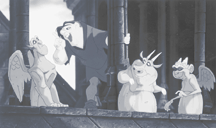Disney Knows That There Is Nothing Like a Notre Dame
The Victor is the loser in Disney adaptation of Hugo's classic novel of medieval Paris
By Richard von Busack
SINCE HISTORY occurs first as tragedy and second as Mel Brooks, Disney's Quasimodo in the new animated feature The Hunchback of Notre Dame looks about as rough as Mr. Magoo. He has a beautiful singing voice and is saluted for not being "an Adonis/but shaped like a croissant is." And there is, of course, a happy ending. The French were just about to forgive us for Eurodisney, too, wouldn't you know it? But the merciless mouse-marketeers figured correctly that liberals would forgive those awful songs if the villain Frollo was a hypocritical Christian, metaphorically burning in lust for the Gypsy Esmeralda. This Hunchback is beautifully timed, considering the Southern Baptist Convention's recent call for a boycott of the heathen Disney. Let the publicists tweak the meaning of the film into some vague message of tolerance for the deformed. The rest of us will see what we see: a murderous fundamentalist sent straight to Hell for his intolerance.
The film follows the essence of Victor Hugo's novel. The hideously (well, in this case, cutely) deformed Quasimodo is an orphaned hunchback, employed as the bell ringer in Paris' Notre Dame cathedral. He falls in love with the street performer Esmeralda, who is also contended for by his villainous foster father, Frollo, and the handsome Captain Phoebus. Esmeralda can perform all sorts of intriguing magic tricks, but when you get too close, she looks like Demi Moore, who does the voice. "Do you fancy me," said a smooth teenager to Emily Lloyd in Wish You Were Here. She answered, "Not half as much as you fancy yourself," which sums my reaction to Moore's persona. Even animated, she leads with her chin.
The male lead, Phoebus (voiced by Kevin Kline) has a hands-in-the-pockets coolness that is a pleasing anecdote to Moore/Esmeralda. I was also fond of the way a peripheral character, Clopin the puppeteer (looking in the advertisements as if he's supposed to be the kiddies' chum), turns out to be a little Richard Widmarkish on his own turf, the Court of Miracles, where all of Paris' Gypsies live. Gypsies are noted musicians, but the score is the worst part. The songs are horrendous, and there are about 800 of them, including a weepy hymn (sung in front of a statue of the Virgin Mary) titled "God Help the Outcasts." God help the soundtrack, which seems to be composed exclusively of outcasts.
The assembly-line method of these Disney productions makes for a number of sequences with different directors. The Hunchback of Notre Dame is, like Quasimodo, a sum of parts. There's no connection between the old-style animated gags during the revels of the Day of the Fools and the weirder and more interesting party the Court of Miracles hosts to celebrate killing some intruders. To pave the way for the happy ending, the movie becomes outright ridiculous: a little girl apologizes to the Hunchback for pelting him with vegetables when he's in the pillory. No prob, kid. The Hunchback of Notre Dame is never a sugary bore like Pocahontas. It's exhilarating in more than a few scenes (most whenever the music isn't about to rise up into yet another cruel song), but it's an example of Chicken McNuggets cinema (as critic Jonathan Rosenbaum has written of Steven Spielberg) in which you have a selection of big moments with no organic connection, big smashing scenes connected with spit.
[ Metro | Metroactive Central | Archives ]

Parapet Pals: Quasimodo pays a call on the gargoyles in Disney's new animated feature, "The Hunchback of Notre Dame."
The Hunchback of Notre Dame (G; 95 min.), directed by Gary Trousdale and Kirk Wise, with voices by Tom Hulce, Demi Moore and Kevin Kline, and songs by Alan Menken and Stephen Schwartz.
From the June 20-26, 1996 issue of Metro
